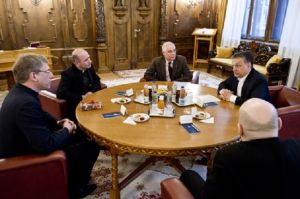Churches in Hungary supporting democracy: Global churches head

Churches in Hungary are committed to playing a role in supporting democracy in the central European nation 20 years after the collapse of communism, the head of the World Council of Churches says.
The comments by Rev. Olav Fykse Tveit, general secretary of the WCC came after meeting with church and political leaders in Budapest this week.
The WCC is a fellowship of churches in 110 countries and territories representing 500 million Christians in various church traditions, including Protestant and Orthodox churches.
"In spite of some difficulties that Hungarian churches are facing, common in this part of Europe, I was impressed by their vivacity and by the role that they are committed and called to play in Hungary, like consolidation of democracy and the defense of human rights and of religious freedom," Rev. Tveit said according to the WCC.
The ecumenical leader, who visited Hungary from April 8-10, made the visit at the invitation of the Ecumenical Council of Churches in Hungary and WCC member churches in the country.
Christian churches in the ECCH are from Reformed, Lutheran, Baptist, Pentecostal, Methodist, Orthodox and Anglican traditions. The group also cooperates with the country's Roman Catholic church and the Hungarian Evangelical Alliance, among other groups.
During the trip, Tveit visited offices of WCC members churches and also met with prominent Hungarian politicians including Prime Minister Viktor Orban.
"It was a good opportunity to make direct contact with the ecclesial and political realities of this Central European country," he said.
He said the encounters helped him to "understand better the challenges and opportunities that Hungarian churches and Hungarian society are facing, twenty years after the collapse of the communist regime."
Tveit added: "For the WCC as a fellowship of churches, it is important to listen to the experiences and discussions churches in Hungary are having on their role in a democratic state."